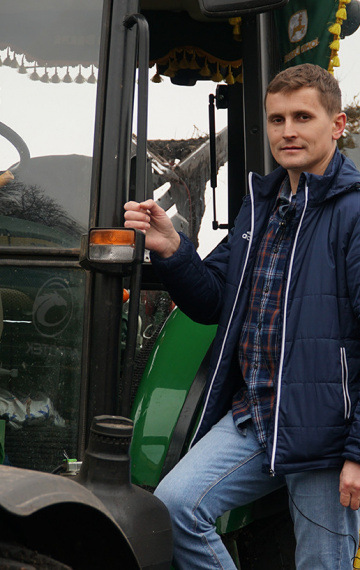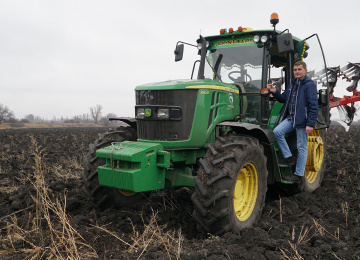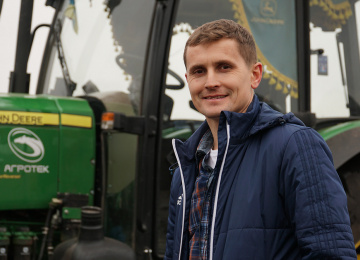Four years ago, some 700,000 hectares of territory in Ukraine had been mined. According to the UN, the Donbas war zone is one of the most mined areas in the world. The mines are gradually being cleared now and the farmers whose land has “yielded” such a deadly crop from the war can finally sow their fields.
The Donetske Farming Enterprise located in Sloviansk County was unlucky to host this kind of danger in one of its fields in 2014. When Swiss sappers cleared it last year, the owner, Oleksiy Dashyvets, set out to make up for lost time. He leased a modern tractor worth some UAH 2 million through the FinancEast Programme being implemented by the Entrepreneurship Development Fund under the EU4Business Initiative. The enterprise began to cultivate its long-idle farmland.
“I had to cross six checkpoints to get to work”
“I’ve been attracted to farm machinery since I was a kid,” says Oleksiy Dashyvets. “My father was head of the collective farm, and I spent all my free time with tractor teams there. I started working when I was ten and I learnt to drive a combine harvester as an assistant at the age of 13.”
It’s obvious why Dashyvets has been involved in farming all his life, even though he officially became a farmer only in 2010. He started with a small parcel of land of 85 hectares and only three fields. By 2014, the economy was gradually getting on its feet. They had enough money to fix their machinery and to buy good seed and fertilizers. Then war came to the Donbas and suddenly they couldn’t plant their land, with APCs running across their fields instead of combines.
Dashyvets is understandably reluctant to talk about those days. He says he was living in Kramatorsk, and all the farm equipment was 15 kilometers away.
“I had to cross six checkpoints, two Ukrainian ones and four separatist ones, to get to work,” recalls Dashyvets’s partner and company co-founder Oleksandr Shvydkyy who lived in the neighboring Sloviansk. “There was no clear demarcation back then and the checkpoints shifted every day. Three kilometers of land were Ukrainian in one direction and three kilometers in the other direction... apparently not.”
The farmers found themselves lending the tools they had used for tractor repairs to the Ukrainian army to fix their equipment.
“Everything that was supposed to shoot has already fired”
A Swiss company cleared Donetske’s fields of mines. But even when the land was not being sown, Dashyvets and Shvydkyy were not idle. He managed to rent several more plots, so that his farm grew to 500 hectares. He also decided to start upgrading his equipment, which he had bought already well-worn. When he found out about the FinancEast Programme aimed at financing SMEs in Eastern Ukraine, he immediately started preparing documents to buy a new Ukrainian tractor.
“Of course, it’s very different from the tractors that we used before, and even more so from the one I drove on my father’s collective farm,” Dashyvets laughs. “This tractor has heating and air conditioning, and a navigation system was included in the price. It also features a hermetically sealed cabin unlike the old ones, where you would climb down after work and all you could see through the dirt were your eyes. This machine cost UAH 2 million, so we made a 10% down payment, and the EDF paid another 10%. We bought the tractor via OTP Leasing with a 3-year loan on the remaining 80% at 16% interest—and half of that loan was covered by the Fund. It was a great deal for us. If not for this funding programme, we could never have bought a tractor—at least not this soon. It has helped us grow a lot."
The farmer says that the seasonal payments arranged with OTP Leasing were very helpful. The loan payment amount varies according to the stage of the farmwork, being less in spring, when they needed to spend money on fertilizers and seeds. Such approaches make a huge difference to farmers.
“Our approach to farming has been completely revamped”
Dashyvets compares his farming to when his father was head of the local collective farm. He says that it’s important to change approaches: less romanticism, more business. It means not to depleting the soil and constantly investing in equipment upgrades.
Today, the Donetske Farming Enterprise grows rapeseed, wheat, corn, sunflower, and legumes. Dashyvets and his wife regularly attend agricultural exhibitions in Kyiv and Minsk, and Hanover is on their itinerary now. They are also looking forward to the launch of a land market in Ukraine, because they are sure that, for small farms, this will be a good opportunity to grow.
“We started to get out of the crisis caused by the war thanks to EU funding programmes,” says Dashyvets. “It has helped us very much to grow. We have big plans for next year, as we want to update all our machinery and buy a combine harvester. It would be great if such programmes went on supporting entrepreneurs in Eastern Ukraine and, in fact, the whole country.”
About the programme
FinancEast is a programme on the renewal of financial investment projects of MSMEs in Eastern Ukraine. It is implemented within Component 2.2 “Economic recovery and development of MSME. Access of MSME to finance” of the “EU Support of Eastern Ukraine” Agreement between the Ukrainian Government and the European Union under the EU4Business Initiative through the KfW German State Development Bank.



